9 de enero 2023

Children of Exile: The Births “Sowing Hope” in the Camp of Nicaraguan Farmers

PUBLICIDAD 1M
PUBLICIDAD 4D
PUBLICIDAD 5D
CONFIDENCIAL names Rolando Álvarez, Bishop of Matagalpa and political prisoner of the Ortega and Murillo regime, as person of the year
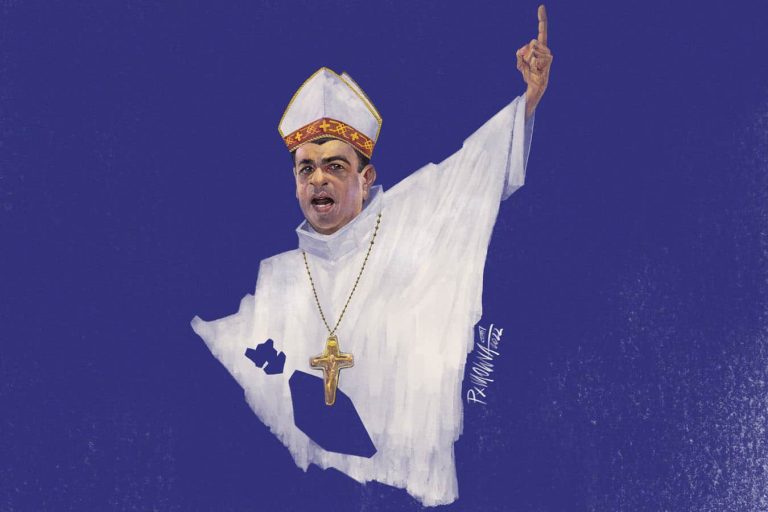
Monsignor Rolando Álvarez is the first bishop in the history of Nicaragua to be a political prisoner. Illustration: PxMolina
“A nation without hope is a nation that holds itself back, it is a people that can no longer see ahead, towards the future, or that thinks it no longer has a future,” reflected Bishop Rolando Álvarez during his homily on August 11, 2022, eight days before being transferred from Matagalpa to Managua under de facto house arrest, without any accusation against him.
Álvarez, bishop of the Diocese of Matagalpa and apostolic administrator of the Diocese of Estelí, is one of the pastoral voices that has been most outspoken and listened to inside and outside Nicaragua in recent years. He is now one of the 237 political prisoners of the regime of Daniel Ortega and Rosario Murillo, which continues to imprison Nicaraguan citizens and opponents under fabricated charges. The bishop's arrest is another attempt by the dictatorship to silence the voices crying out for justice in the face of its repression in Nicaragua.
In 2022, Bishop Alvarez was persecuted by the Ortega Police and was also the victim of a hate campaign on social networks executed by the State's troll farm. However, even in the darkest moments, which included transgression against his own family, his voice did not cease: “May the Lord always grant us ways of civic and peaceful solutions to all our problems and difficulties,” he said in one of his last homilies.
The Editorial Board of CONFIDENCIAL selected Monsignor Rolando José Álvarez Lagos, 56 years old, the first bishop political prisoner in the history of Nicaragua, as the main figure of 2022. A recognition of his coherence, his pastoral work, the example of his dignity and his resistance in the face of persecution and harassment, and above all, his prophetic voice that even as a prisoner of conscience cannot be silenced by the Ortega dictatorship.
After 116 days under de facto house arrest, this December 13, Monsignor Alvarez was charged with the alleged crimes of “conspiracy to commit undermining national integrity and propagation of false news”. A case with fabricated crimes, in charge of the Ortega's justice system, and executioner of Nicaragua's political prisoners.
This January 9, 2023, the bishop completes 143 days of house arrest in Managua, which increases to 152 if we include the 15 days he was locked up together with other religious and lay people in the Episcopal Curia of Matagalpa.
Ortega’s propaganda tried to strip him of his religious title. The bishop was identified by his plain name, exhibited without his ecclesiastical vestments, by himself and in silence.
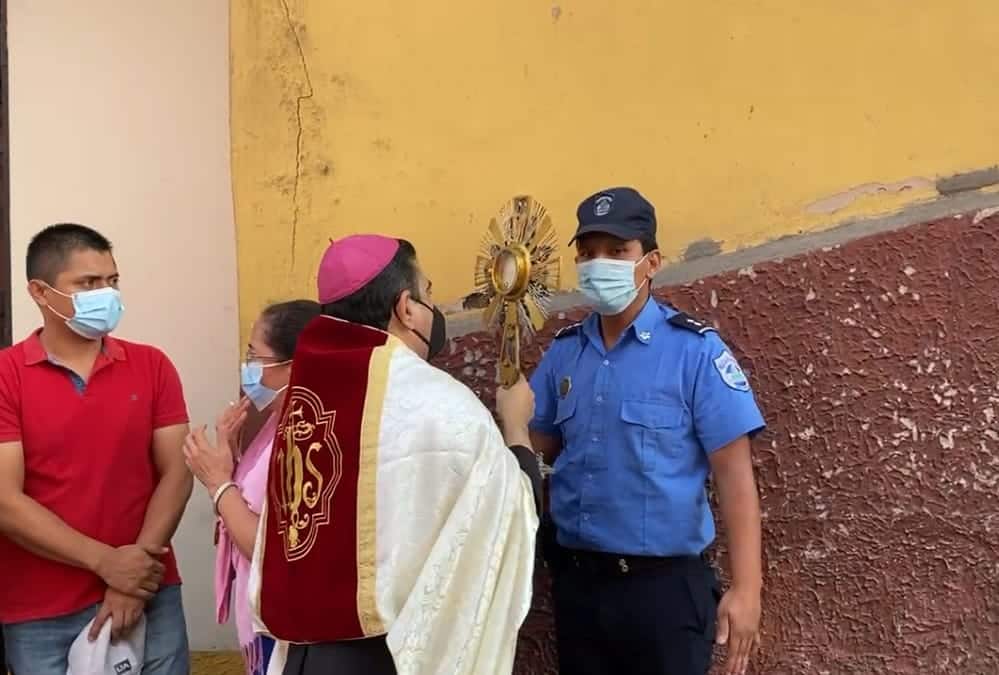
In August 2022, Monsignor Rolando Álvarez tried to leave the Episcopal Curia with the custody of the Blessed Sacrament, but was prevented from doing so by police officers // Photo: Archive
Monsignor Rolando Alvarez won the affection and respect of his parishioners the moment he arrived in Matagalpa. He was received with applause, balloons, fireworks, and joy by the community that today laments his arrest.
In the eleven years he has been a bishop, and 28 years of priestly life, Monsignor Alvarez has been characterized by his close and firm voice. The same voice he raised in favor of the peasants who opposed the mining extraction in Rancho Grande, of the victims of police abuses such as the case of the peasant Juan Lanzas, who lost both legs due to police brutality.
His voice was also heard together with bishops of the Episcopal Conference of Nicaragua (CEN) who mediated in the National Dialogue that summoned Ortega for the massacre and repression against the citizen protests of the April Rebellion of 2018. He also said the viral phrase: "Respect the homeland!" which he said when his solidarity with the victims of the repression was questioned.
In 2022, when the political persecution of the dictatorship escalated against the Catholic Church, the bishop again raised his voice to denounce the police siege that included the intrusion of police agents in the home of a family member.
In protest, the bishop took refuge in Managua and began a fast of water, serum and prayer. The police besieged him and then pursued him to Matagalpa, but days later he took to the streets with the Monstrance of the Blessed Sacrament in his hands to demand an end to the police siege against the priests of his Diocese.
"We are convinced that everything happens for our own good because God loves us and we love Him. Painful experiences do not fall in vain, no. These experiences are offered to the Lord and the Lord returns them in blessings for us. Blessings for our beloved Nicaragua", said the bishop, when he was already locked up – although without a court order – together with other priests in Matagalpa.
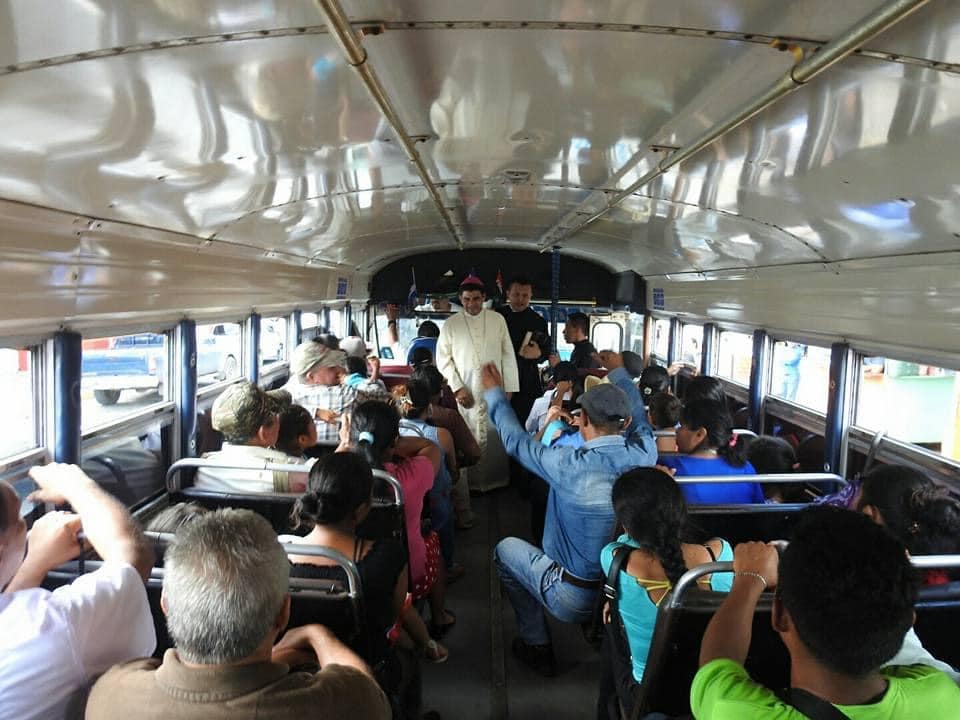
In eleven years of bishopric in Matagalpa, Monsignor Rolando Álvarez evangelized aboard buses and in remote communities of the department // Photo: Archive
The life of Monsignor Alvarez, who turned 56 on November 27, 2022, is full of contrasts. In his youth, he escaped the compulsory military service of the 1980s and gave up a romance to devote his life to the priesthood, without imagining or having any ambition that one day, not far down the road of his pastoral journey, he would be consecrated as a bishop.
“I entered the seminary and one day, in 1983, and I saw a young man arrive to take refuge in this training center, he was fleeing from the Sandinista persecution, he was the boy who coordinated the Catholic youth groups at the national level. Years later that young man would be Monsignor Rolando Alvarez", says Father Edwin Roman, former pastor of the San Miguel church in Masaya, exiled due to persecution.
Father Román didn’t see the young Rolando again because sometime later, he left for Guatemala with his family, where he finished high school and became a seminarian, after pondering for a year if this was his true vocation.
On December 7, 1994, the day of La Gritería in honor of the Immaculate Conception of Mary in Nicaragua, Alvarez was ordained as a priest and 17 years later, in April 2011, he was consecrated as a bishop.
“I never expected to be a bishop, I always thought I was going to be a close collaborator and close to the bishops, to those who were my bishops, and dedicate my heart and soul to this pastoral work, but as a priest,” said the prelate to the Catholic channel Diocese Media of Matagalpa, when he completed his first five years as bishop.
At that time, Monsignor Alvarez was already a priest of the Francis of Assisi Church in Managua, and also served as secretary of the media department of the Episcopal Conference, which marked his interest in the media as an evangelizing channel, and was assistant secretary of the Episcopal Secretariat of Central America.
Pope Benedict XVI appointed him as the ninth bishop of Matagalpa. According to what Álvarez told to the Magazine of the newspaper La Prensa, the Pope offered to consecrate him in Rome, but he rejected the proposal because he wanted to do it in Nicaragua, with his family, loved ones and mentors.
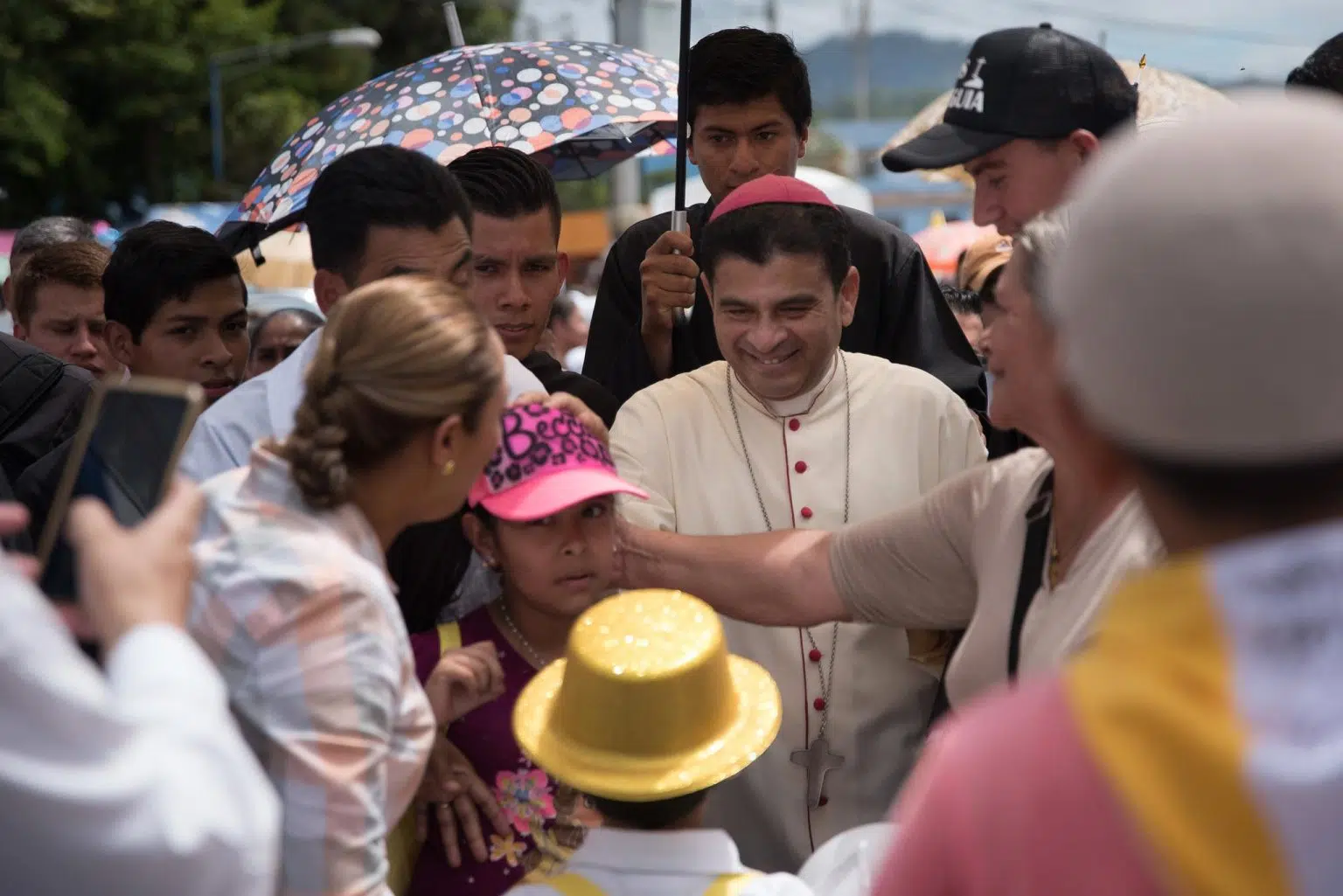
The parish of Matagalpa is very close to Monsignor Rolando Alvarez. In the communities he is received with joy and hugs. Photo: Confidencial | Archivo
On April 2, 2011, Monsignor Rolando Álvarez left Managua for Matagalpa. The farewell was brief. According to newspaper reports of the time, a few faithful came to his parish to bid him farewell and, after a few hugs and tears, he left for his new home. But in Matagalpa, the faithful were waiting for him with joy, and many came out to greet him with great jubilation on the side of the road.
“The people overflowed the streets. Some even cried. Schools brought out their marching bands. Several businesses exchanged their advertising reggaeton for songs to the Virgin. The houses where he passed were adorned with images of the Virgin Mary, John Paul II and the new bishop,” reported a chronicle of La Prensa. Later, in the Cathedral, there was no room for the crowd that wanted to enter and had to watch the ordination rite from giant screens installed outside.
The support that Monsignor Alvarez received that day was only a prelude to the affection that years later he won as bishop in the hearts of the parishioners of that department, which he calls his home.
“I already feel like a true “norteño” (northener), one of those who walk in the city or those who ride horses or sing rancheras,” he said in his first bishop's message.
Monsignor Alvarez is one of the bishops who interacts the most with his community. He has been seen crossing rivers in small rafts or on horseback, climbing mountains on foot or by mule to reach the most remote places of Matagalpa, where he is received by crowds that take advantage of the occasion to get married, baptize their children, make communions and other religious activities that end in celebration.
“It is a project of life to visit all the faithful in their own areas, in their own homes, communities, it is a personal pastoral project and of the Diocese, and also a long historical tradition that comes and proceeds from the first bishop,” said the bishop, who set himself the goal of visiting the more than 400 communities in the department.
The bishop has also been seen preaching aboard buses or dancing without any care among the young people of the Catholic pastoral, breaking piñatas in honor of his birthday, mopping the church or shopping in a supermarket like any other citizen.
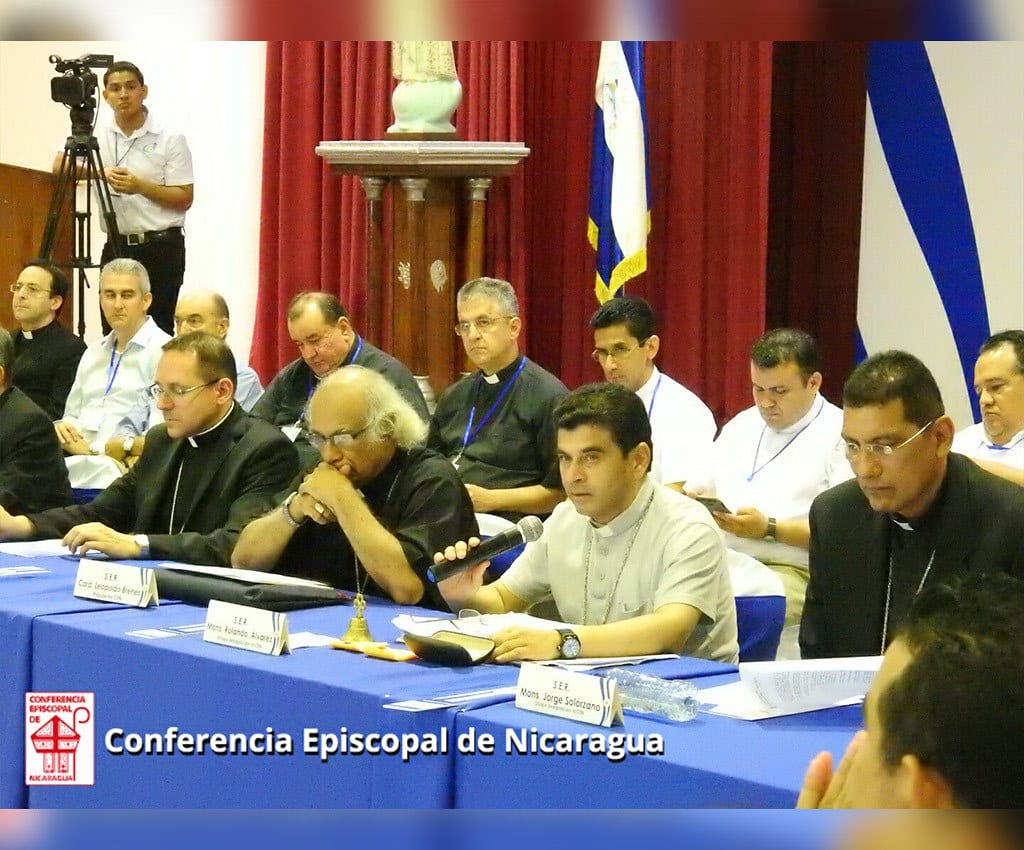
In 2018, Monsignor Rolando Álvarez participated along with the bishops of the Episcopal Conference of Nicaragua in the National Dialogue. Photo: Archive
The public life of the bishop of Matagalpa is marked by his social and political reflections so necessary in a convulsive country like Nicaragua. In 2015, when he denounced extractivism in the Rancho Grande area, he got the Government to declare that mining exploitation unviable.
During the first attempt at National Dialogue, in 2018, Alvarez was the main moderator of the failed negotiation, and his voice was heard by both sides, although the regime did not comply with the agreements and withdrew from the table without putting an end to the repression.
The bishop was one of the priests that the Ortega regime vetoed from the second negotiating table of 2019, when another dialogue was attempted between the Government and the civil society, in which the bishops of the CEN participated as companions and witnesses, together with the Apostolic Nuncio. At the same time, the regime launched a hate campaign against the “most uncomfortable” religious: Monsignor Alvarez, Monsignor Silvio Baez (currently in exile) and Monsignor Abelardo Mata (today bishop emeritus of Esteli).
In the last four years, Monsignor Alvarez has been the target of hate campaigns by Sandinista sympathizers who have accused him of being an accomplice in the alleged “coup d'état”. He was also besieged by the police and paramilitaries who desecrated the cathedral and assaulted one of the collaborators of the Diocese.
“Do not do with the faithful what you want to do to me. Whatever you want to do to me, if you are going to do it, do it to me and not to the faithful, not to the holy people of God, I tell you with all clarity and simplicity,” said the bishop after denouncing the attack on one of his lector ministers.
This article was originally published in Spanish in Confidencial and translated by our staff.
Archivado como:
PUBLICIDAD 3M
Confidencial es un diario digital nicaragüense, de formato multimedia, fundado por Carlos F. Chamorro en junio de 1996. Inició como un semanario impreso y hoy es un medio de referencia regional con información, análisis, entrevistas, perfiles, reportajes e investigaciones sobre Nicaragua, informando desde el exilio por la persecución política de la dictadura de Daniel Ortega y Rosario Murillo.
PUBLICIDAD 3D